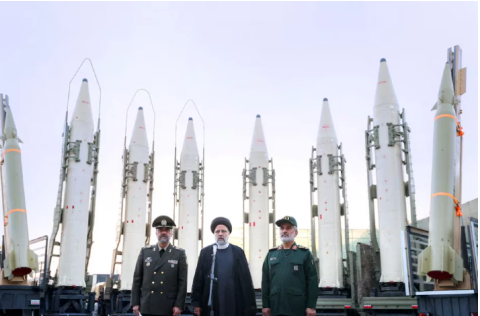Russia has received ballistic missiles from Iran and is expected to use them in Ukraine within weeks, U.S. Secretary of State Antony Blinken stated on Tuesday, warning that the growing cooperation between Moscow and Tehran poses a threat to broader European security.
Speaking at a news conference in London before his visit to Kyiv with Britain’s Foreign Secretary David Lammy, Blinken revealed that Washington had privately cautioned Iran that supplying ballistic missiles to Russia would represent “a dramatic escalation.” He added that new sanctions would be imposed later that day.
“Russia has now received shipments with these ballistic missiles and will likely use them within weeks in Ukraine, against Ukraine,” Blinken said, referencing intelligence that has been shared with U.S. allies and global partners.
He further explained that Iran had trained dozens of Russian military personnel to operate its Fath-360 close-range ballistic missile system, which has a maximum range of 75 miles. Reports indicate that Russian defense officials signed a contract with Iranian authorities in December for the Fath-360 and another ballistic missile system, according to Reuters.
On Monday, a senior Iranian official denied claims that Iran had supplied Russia with ballistic missiles, calling the reports “psychological warfare.” Kremlin spokesperson Dmitry Peskov did not confirm the reports but acknowledged that Russia is cooperating with Iran on “the most sensitive” issues.
After more than two years of war, Ukrainian forces are now stretched, facing continued Russian advances in the eastern part of the country. Last month, Ukraine launched its first large-scale incursion into Russian territory.
Blinken highlighted that the Iranian missiles could be used against closer targets, allowing Russia to conserve its own arsenal for more distant objectives. “This development and the growing cooperation between Russia and Iran threaten European security and demonstrate how Iran’s destabilizing influence reaches far beyond the Middle East,” he said.
He also noted that Russia, which had previously adhered to United Nations restrictions on Iran, was now sharing technology sought by Tehran. “This is a two-way street, including on nuclear issues as well as some space information,” Blinken added.
Regarding sanctions, Blinken mentioned that although Iran is already one of the most heavily sanctioned nations, there would be additional economic penalties. However, some experts have raised concerns that such sanctions might harm the middle class more than the country’s leadership.
U.S. Secretary of State Antony Blinken announced that additional sanctions on Iran would include measures targeting the airline Iran Air. France, Germany, and Britain also issued a joint statement condemning Iran and Russia for escalating tensions and vowed to impose sanctions on Iran Air.
The UK, in response, introduced seven new sanctions under its Iran regime and three under its Russia regime. Ukraine expressed its support for further sanctions against Iran due to its missile transfers to Russia. Andriy Yermak, Ukraine’s presidential chief of staff, emphasized Kyiv’s desire for U.S. approval to use American-supplied weapons more deeply within Russia.
Earlier this year, the Biden administration eased its policy, allowing Ukraine to use U.S. weapons to strike Russian forces that are actively attacking or preparing to attack across the border. However, Yermak reiterated on social media platform X, “We also need authorization to use Western weapons against military targets on Russian territory, the provision of longer-range missiles, and the enhancement of our air defense systems.”
Blinken stated that during his visit to Ukraine on Wednesday, he would discuss Ukraine’s current needs and goals with its leadership, exploring how the U.S. can further assist. Blinken and Britain’s Foreign Secretary David Lammy will visit Kyiv together as a show of united Western support. The State Department also confirmed that Blinken would visit Poland on Thursday.



